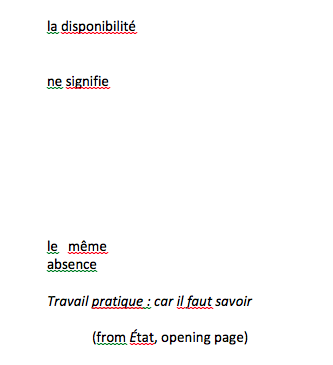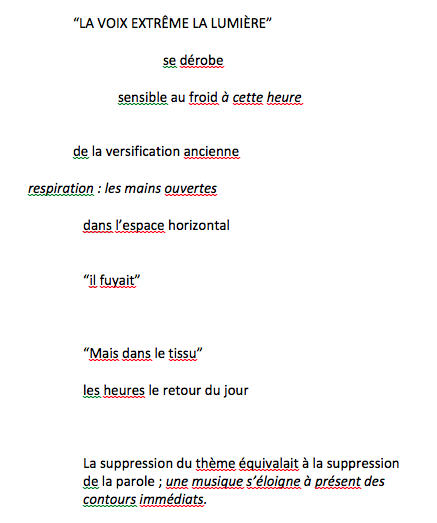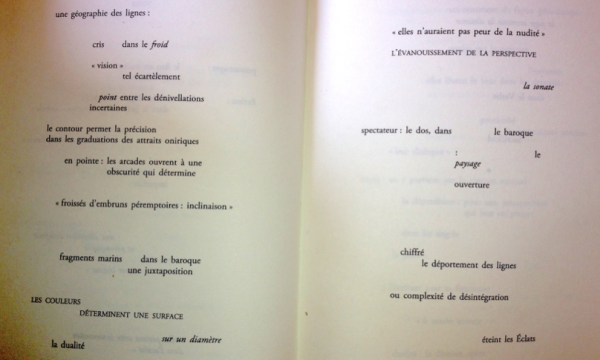6th ANNUAL NAPOMO 30/30/30 :: DAY 28 :: JONATHAN SKINNER ON ANNE-MARIE ALBIACH
[box][blockquote]HAPPY POETRY MONTH, FRIENDS AND COMRADES!
For this, the 6th Annual iteration of our beloved Poetry Month 30/30/30 series/tradition, I asked four poets (and previous participants) to guest-curate a week of entries, highlighting folks from their communities and the poets who’ve influenced their work.
I’m happy to introduce Janice Sapigao, Johnny Damm, Phillip Ammonds, and Stephen Ross, who have done an amazing job gathering people for this years series! We’re so excited to share this new crop of tributes with you. Hear more from our four guest editors in the introduction to this year’s series.
Hungry for more? there’s 150 previous entries from past years here! You should also check out Janice’s piece on Nayyirah Waheed, Johnny’s piece on Raymond Roussel, Phillip’s piece on Essex Hemphill, and Stephen’s piece on Ronald Johnson’s Ark, while you’re at it.
This is a peer-to-peer system of collective inspiration! No matriculation required.
Enjoy, and share widely.
– Lynne DeSilva-Johnson, Managing Editor/Series Curator [/blockquote][/box]
[line][line]
[box]
WEEK 4 :: CURATED BY STEPHEN ROSS
The community of poets and scholars convened here for the OS’s National Poetry Month has never existed, as far as I know, in the same geographical or electronic space. Yet I’m moved to see that the members of this new community (excluding the New Yorkers) all hail from the places I’ve lived that mean the most to me: Montreal, the UK Midlands, North Carolina, Georgia. I canvassed old friends and new acquaintances, as well as friends of friends, to contribute to this year’s Poetry Month, and am delighted to find how meaningfully the contributions resonate with each other. These mutually reinforcing energies are not simply a matter of aesthetic and/or political affinities between the poet-scholars and their poets, but emerge from each contributor’s recognition and appreciation of the particulars of their chosen poet.
Contributions by Charles Gonsalves (on Barbara Guest), Sarah Huener (on Eileen Myles), and Aaron Goldsman (on Tommy Pico) span three generations of what some might still be pleased to call the New York School–which generation are we on now? Other contributors attend to the limits of poetics: Klara DuPlessis reflects eloquently on Anne Carson’s (de)creative refusal to finish a book, while Zohar Atkins ponders William Bronk’s endless rewriting of the same poem. Aaron Belz’s tribute to Robert Bly’s translations of César Vallejo speaks to the winding, unpredictable process of poetic influence.
Stephen Ross is a literary scholar, translator, and editor. He earned his PhD in English from the University of Oxford in 2013 and is a founding editor of the literary web-journal, Wave Composition. With Ariel Resnikoff, he is working on the first-full length translation and critical edition of Mikhl Likht’s Yiddish modernist long-poem, Processions. He is a contributing editor for The Operating System’s Unsilenced Texts series, and also co-editor with Dr. Alys Moody of the forthcoming anthology, Global Modernists on Modernism (Bloomsbury, 2017), a 190,000-word sourcebook that draws on a large archive of historical materials — statements, manifestos, letters, prefaces, introductions, hybrid works, etc — by modernist practitioners across the arts, with a special focus on untranslated, poorly disseminated (in English), and ‘forgotten’ texts. His current book project is a study of modern American poetics and objecthood.
[/box]
[line][line]
JONATHAN SKINNER ON ANNE-MARIE ALBIACH
[line]
[textwrap_image align=”left”]http://www.theoperatingsystem.org/wp-content/uploads/2017/04/Albiach-Anne-Marie-e1492809879229.jpg[/textwrap_image]
Dear Anne-Marie, Here in Central France, in the month of April (2017), surrounded by nightingales singing like mad (in the dazzle of noon as well as by night), I am (re)reading your books four and a half years after you left us—your collected writings (Cinq le Choeur: 1966-2012, Flammarion, 2014). I want to see and hear your writing anew. What was it that drew me in, captivated and led me to write on your work, eventually to meet you? I remember first discovering some of your pages in a (then new) anthology edited by Henri Deluy, Poésie en France, 1983-1988 (Flammarion, 1989), a selection from Mezza Voce, including Esquisse: “le froid” (“PULSION: née dans les sommeils/ elle élabore la scene du jour”) and perhaps “Théâtre” (“une fiction blanche reprend sa ponctualité”). What’s this!? A poetry nearly without image, ruthlessly suspicious of metaphor, visual in an “abstract” way that is not decorative, sounding in a way that is not “concrete” yet almost overwhelmingly physical in its mental exertions. I wanted to know, still want to know it, more closely.
Can your “theatre of the page” grip those outside of French poetry, not already under the spell of Racine, Rimbaud, Mallarmé, Jabes, Jouve? I like to think so. You also were a close reader of Shakespeare, Zukofsky (whose “A” 9 you translated), Kafka. You benefited from excellent translations of your work by the Waldrops, Simas, Bernstein, and others. Your praises have been sung by poets as different as Palmer, Swensen and DuPlessis. I suspect a description of your work is inseparable from the phenomenology of each reader’s engagement, from what I read in your pages today.
Mezza Voce—the open scene of your work. A collection of word plays, stagings of language: Distance: “Analogie”, “Le voyage d’hiver”, “La voix extrême la lumière”, “. . . Où la forêt est la plus sombre”, Esquisse: “le froid”, “Théâtre”, “DiScours”, Objet, Le double, CÉSURE: le corps, La nudité comme apparat, Strates . . . Even this list of titles throws conventions of punctuation and capitalization into question. It is a “theatre” of the page, choreography of letters. A ritual or hieratic dance, with vulnerable joints (wrists, ankles) offered up to the stage lights at crucial moments: words and phrases in italics, all caps, quotation marks move in from the margins, take up positions either side of the gutter, strike static poses. Language that does not bear the weight of obvious meaning finds freedom in rigid articulations, in the way breath translates directly into the movement of a marionette’s limbs. (I’m thinking of your wonderful piece on Kleist in Anawratha, your collection of critical writings.) The eros of these stilled yet moving limbs is at white heat.
[line]
[line]
On the other hand (and here the connection with Claude Royet-Journoud is crucial, and through him and others perhaps with certain aspects of the “Black Mountain” emphases, with Creeley more than Olson), what you present is (nothing more than) a body writing, referenced from moment to moment, gambled beyond narrative and logic, on the impulses of breath. Yet lent the splendor of a pageant (“LA NUDITÉ COMME APPARAT”): I think of the tableaux of Parajanov, in his film on the life of Armenian poet Sayat-Nova (Color of Pomegranate). Except without images—a silent film with no scenes, only captions in the projector’s blinding light. Something of the mystery play, the masque inheres in the poise of all caps and italicized words across, say, the spread of Esquisse: “le froid” (“CONSTAT . . . INCISION . . . ORNEMENTS . . . OBJET . . . SCÈNE . . . DÉPORTEMENT”). But the style is baroque not medieval, with movement introduced in the swerve (“DÉPORTEMENT”) and shimmy of syntax, as the eye moves down the page, in the references to curves and calligraphies, to a geometry of rested impulse, “le Souffle/ sculptural.” As with sculpture (the white page of “Le voyage d’hiver”), the articulation is both tacit and sounded: statement, erasure, impulse recaptured.
Your language is “recidivist,” falls back on itself—writing as the effort (you have said) of the body, “bearing the blank of the fiction that divides it,” to get up. A body offered to grammar, written in bruises and scars. The testimony, not reportage, of violence: far too close (for comfort) for voyeurism. Every metaphor indicted, placed in quotes, the language has thoroughly read itself, for the reader who looks into a dizzying reading of the reading of the poem. Phrases caption other, suppressed phrases—yet with the physicality of anterior and prospective immediacy, as writing opens the body in search of ancestral warmth. To locate memory inside the body, writing as descent (you said), into the cave to rediscover the ancestral light, to try to put it out to be reborn (as in one of your key texts, Mallarmé’s Igitur). What the body aspires to be is re-membered, in a catalog of gestures, language emptied of expression, replaced with quoted intervals: interruption, displacement; overheard intercut fugal structures; a play made entirely of stage directions.
[line]
[line]
When I wanted to translate “étreinte” as “grip” and you said, no, it’s an “embrace,” the truth for me remained somewhere in between, in that exchange—your page is loving, intimate, but also severe. It’s not jazzy but terrifyingly poised (the resemblance to Olson’s “composition by field” only skin deep). There’s a sense in which one could be blinded by language, that language is already operating beyond the shadows of sight, in a realm of invisible but utterly concrete realities. Polyphonic, multiply voiced, Bach in syntax.
Your much earlier, foundational book État builds this stage and its machinery—it’s the ur text, really, your method, of writing not on or with, but in the space of the page. In État you establish spacing (Mallarmé’s “espacement de la lecture,” or, in your terms, “compacité du déplacement”), how it takes breath, and bodily tension, into another grammar, one articulated by silences as much as words. I’m thinking of Joanne Kyger, a very different sort of writer who embraced the syntax of space with just as much precision and elegance. Anyone who thinks your mathematics are metaphorical need only look at the structure of État: a book-length poem in two sections dividing the book exactly in half, Enigme and État. The mirror-like structure is offset by unequal subdivision of the equal sections: Enigme an ennead, of nine parts, while État has four parts. The second half of the first part of État is a Commentary or monologue on the first half; the second part is made up of successive Retrospectives of its first movement (opposition : I), while the third part offers a Commentary on the preceding event; finally, the fourth part, Term (the infernal), contains a Rétrospective: what preceded, how. A Table at the end of the book sums this structure up. As you confirmed in an interview, it is a spiral structure—inspired by the image on the Egyptian tarot card of a woman caught in a spire.
[line]

[line]
A movement through language produces a “syntactic body”—consciousness carried away resisting the terms of writing, misconduct (what did you think of Notley’s “disobedience”) wresting a new syntax from given orders. Every book is a gamble, you said, proposing “the blasphemy of luxury.” Refusing causality, you use the very literal parameters of writing—a wrist, a page, a book; letters, words, typographies; spaces—to enact a ritual encounter of consciousness with the human archaic. Your writing (I wrote in a 1998 review of A Geometry for the Poetry Project Newsletter) is an “incantation” that at once invokes and extinguishes the ancestral light, singing into the genetic code to undo it, where the poet “gives birth in the lineage of chance.”
Does it work in English? Yes, at least in the sense that typography must accompany your translations. Yet so much of your writing’s sensuality inheres in the way words like “poitrine,” “taille,” or “chevelure” stand exposed, with all the Gallic fullness of their eros, within a severely reduced vocabulary (you are most Racinian in this regard), how much the formal conduct of the Alexandrine sounds tacitly within the luxury of your misconduct. Your writing is destined (like much great poetry) to mistranslation—it cannot but be “mis” apprehended in the environments of British or American English. (Given how you write across the spread, there can be no question of “facing” translations: what of an electronic edition that might reveal the French “beneath” the English?) That is all right: I don’t care how readers fall in love with you, but I want them to fall in love. I can use these terms because your writing is impersonal yet utterly intimate. One never quite feels familiar with one of your books, yet such are its premonitions of desire that awe succumbs to intimacy, fear to love.
Do I embrace your kind of writing? I think not. (When first under your thrall, I shared some poetry with a friend, who told me to “stop wearing the language on my sleeve.” I must not have the visual confidence to work with the page in that way.) But could I write with as sure a sense as I do now, at the very least, of what isn’t working in a given draft, without the knife of a sensibility (“aesthetics/ our only immortality”) sharpened on the pages of your work?
You have opened our eyes and ears, concretely and beautifully, alerted our hearts and minds to the stakes of writing, to what is given, to what can be gained and lost, when necessity embraces chance as wrist meets blank sheet, as breath pushes thought inspiring perception, as terms cut in, as blasphemy must be done. If I think of the page as the earth, the very ground beneath our feet, then perhaps, yes, I do embrace your example. Rereading one of your earliest texts, Flammigère, I realize today that one of the flames your work carries is that of the earth itself, as birds vary their repetitions in the lengthening shadow of the leaves: the engendering heat that moves your writing, that moves our reading of it, that is the movement of life in and out of the ground, is one and the same.
[line]
[articlequote]spirit of the plants
for millennia the earth has been returning to us
and we go to earth
in the spirit of the plants”[/articlequote]
[line]
Bibliography:
Flammigère (Siècle à mains, London, 1967)
État (Mercure de France, Paris, 1971)
Mezza Voce (Flammarion, Paris, 1984)
Anawratha (Spectres Familiers, Le Revest, 1984)
“Figure vocative” (Lettres de casse, Paris, 1985)
Figurations de l’image (Flammarion, Paris, 2004)
Cinq le Choeur 1966-2012 (Flammarion, Paris, 2014)
In English:
Mezza Voce (Trans. Josef Simas, w/ Lydia Davis, Anthony Barnett, Douglas Oliver. Post Apollo, 1988)
État (Trans. Keith Waldrop. Awede, 1989)
Vocative Figure (Trans. Joseph Simas & Anthony Barnett. Moving Letters, 1986)
“Work Vertical and Blank” (Trans. Charles Bernstein, Conjunctions 23, 1994)
<https://media.sas.upenn.edu/jacket2/pdf/Bernstein/Albiach-tr-Bernstien_verticalblank.pdf>
A Geometry (Trans. Keith and Rosmarie Waldrop. Burning Deck, Serie D’ecriture, Supplement, No. 3, 1998)
Two Poems: Flammigere and the Line … the Loss (Trans. Peter Riley, Shearsman e-book, 2004)
Figured Image (Trans. Keith Waldrop. Post-Apollo, 2006)
List of various translations: <http://wings.buffalo.edu/epc/documents/frenchpoetry.html>
Other resources:
Manuscript pages from État:
<http://epc.buffalo.edu/library/Albiach-Anne-Marie_Etat-mss.pdf>
A Discursive, Space (Interviews with Jean Daive, Trans. Norma Cole, Duration Press, 1999): <http://www.durationpress.com/wp-content/uploads/2015/10/Albiach-Anne-Marie_A-Discursive-Space.pdf>
Interview with Alain Veinstein (France Culture, 2003):
<https://www.youtube.com/watch?v=adxHSrFnjq0>
[line][line]
[textwrap_image align=”left”]http://www.theoperatingsystem.org/wp-content/uploads/2017/04/SKINNER-e1492808777750.png[/textwrap_image] Jonathan Skinner founded the journal ecopoetics. His books include Chip Calls (Little Red Leaves, 2014), Birds of Tifft (BlazeVOX, 2011), Warblers (Albion, 2010) and Political Cactus Poems (Palm Press, 2005). He teaches in the Writing Program at the University of Warwick.
[line]
[h5]Like what you see? Enter your email below to get updates on events, publications, and original content like this from The Operating System community in the field below.[/h5]
[mailchimp_subscribe list=”list-id-here”]
[line]
[recent_post_thumbs border=”yes”]




